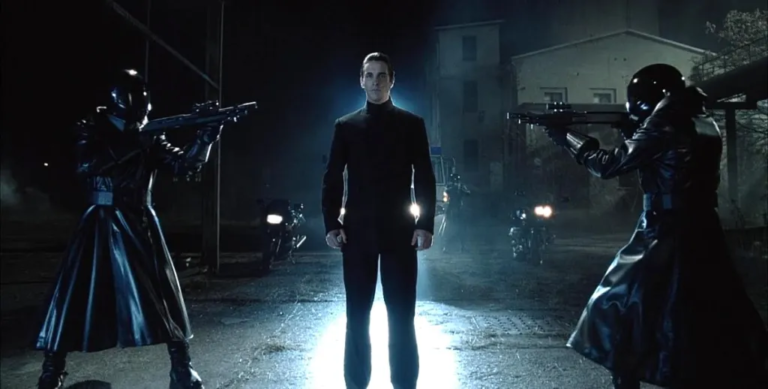
A look back at the Christian Bale-led, Matrix-influenced sci-fi action classic Equilibrium (2002).

The Matrix updated the dystopian movie genre for the 21st century. 2002’s Equilibrium may seem like another copycat at fist glance, but director/writer Kurt Wimmer together with rising star Christian Bale delivered a gripping Sci-Fi actioner, so let’s have another look!
After world war 3, a totalitarian society emerges where human emotions are blamed as the prime cause for devastating earth, and rendered illegal. Everyone takes the drug Prozium that suppresses feelings. Not everyone complies, and a government elite unit, the Clerics, are tasked with finding and eliminating all sense offenders. Cleric Preston (Christian Bale) is the best of them, but when he misses a Prozium dose, he begins to feel again, and his loyalty to the regime is put to the test.
It is not the message that is important, it is our obedience to it
Forced suppression of emotions is an unusual premise for a dystopian story, fascist regimes often use them to their advantage or, as in Brave New World, lul the people with pleasures. It’s an interesting thought experiment nevertheless. The drug Prozium also works as a reminder of the alleged moderation of unwanted emotions through medication in our world, and the ever-increasing usage of antidepressants and stimulants gives some credence to this claim.
Equilibrium borrows heavily from Fahrenheit 451 with its mandated burning of paintings and poetry books. The film as a whole is derivative in premise and style, and throws together many classic Dystopian tropes. The plot does not have many surprises in stock, and yet Wimmer assembles the well-known pieces into an interesting mosaic that is strong on atmosphere, has plenty food for thought, and is full of kick-ass action.
Without love, anger, and sorrow, breath is just a clock ticking
The monumental buildings of the fascist era in Berlin and Rome were used as sets, and evoke a constant aura of awe and dread. And the ruined city blocks of post-communist Eastern Germany provide an effective stage for the post-war wasteland shown in the film. The smart choice of shooting locations gives the film a unique visual style, and a pervasively bleak atmosphere.
Every member of the cast is doing a fine job but this film is Christian Bale’s show. Bale is one of the great actors of our times and his performance elevates the quality of the movie significantly. He displays a stunning range of emotions with some truly heartbreaking moments. His Preston starts out as a stone cold lethal enforcer with a piercing stare, who shows first cracks with brief emotional outbursts, and ends up in a full breakdown that transforms him into a remorseless avenger.
The geometric distribution of antagonists in any gun battle is a statistically predictable element
Preston’s awakening is accompanied by a pile of battered and perforated bodies. Director Wimmer takes combat to the extreme with the Gun Kata style, which can only be described as an ultra-high-speed close-range Gun Fu. Split second movements and kills every 100 milliseconds make for some incredibly intense and brutal action sequences.
The film’s minimalist and monochromatic visuals are effective to draw our full attention to the action. The extravagant and impossible fight choreography is captured flawlessly by a kinetic cinematography that does not rely on hectic editing. And it all just looks so badass with the Clerics in their slick coats going guns akimbo while flanked by riot police squads in a post-war wasteland.
Equilibrium owes its existence to The Matrix, and just like its muse, it delivers a fine (if less refined) blend of action and mental nourishment. Thanks to a stellar performance by Bale and absurdly intense action sequences, it became an ultimate early 2000s action classic!